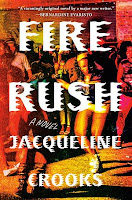Book Review: Fire Rush by Jacqueline Crooks

Set in the late 1970s and 80s Fire Rush by Jacqueline Crooks follows second-generation Jamaican –British Yamaye, as she embarks on a journey of self-discovery. We meet her in her early twenties, living with her father, who, for the most part, ignores her in a run-down apartment complex in Norwood, London. Her mother, a midwife, never returned from a work trip to Jamaica when she was a child. Working a night-shift factory job, the only vibrant aspect of her life is the time she spends with her friends at The Crypt, an underground dub reggae club amidst the music and the ganja clouds, or in the local record store. When she meets Moose, a carpenter and fellow Jamaican, at the club, she begins to dream of a life different from her own. But when tragedy strikes and violence erupts, she escapes to Bristol with a recent acquaintance who forces her into a life of crime. Fortunately for her, she finds a way out. Eventually, she travels to Jamaica on a quest of a more personal nature, but will she find what she is looking for?
“Because nowhere’s safe–not the streets, governed by police with barbed-wire veins; not our homes, ruled by men with power fists as misshapen as their wounds. The only place to live and rage from is our hearts.”
With its compelling characters and an intense (at times suffocating, fever dream-like) narrative that flows with a pulsating rhythm, Fire Rush by Jacqueline Crooks is unlike any other book I have read. The author states that this novel is a fictionalized account of her own life. The tone of this novel is dark and forceful, yet poetic. The author uses vivid imagery to describe the dub reggae scene and the underground club culture of the era. The impact of racial tensions and surveillance and social and economic inequality on the Jamaican diaspora, in particular, is explored in great detail. In Yamaye we see a young Black woman searching for her voice, lonely in a crowd, craving for a sense of acceptance and belongingness, trying to fill a void in her life left by the absence of her mother and her mostly indifferent father with music, with friends, and with relationships among other things. Her journey is a difficult one largely impacted by the volatile socio-political landscape of the era and fraught with questionable choices and untrustworthy characters, but we keep rooting for her as her search eventually takes her on a journey of self-awareness, instilling in her a sense of worth and hope for a brighter future. The only constants throughout her journey are her music, her innermost thoughts, which she expresses through the same medium and the voice of her mother she hears in moments of utmost despair. The author addresses themes of racism, police brutality, violence and crime as well as self-discovery, spiritualism, and the mysticism of Jamaica to create an absorbing narrative. The dialect (Jamaican patois) took a while for me to get used to, but overall, this is a stunning debut that I could not put down.
Comments
Post a Comment